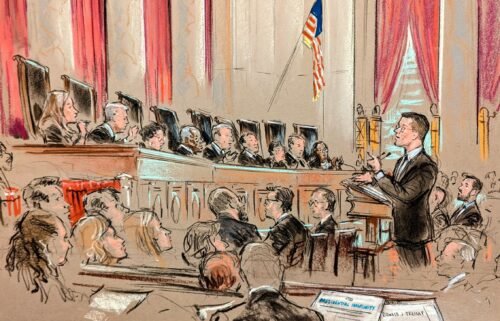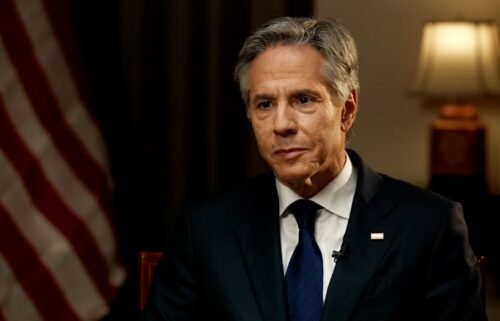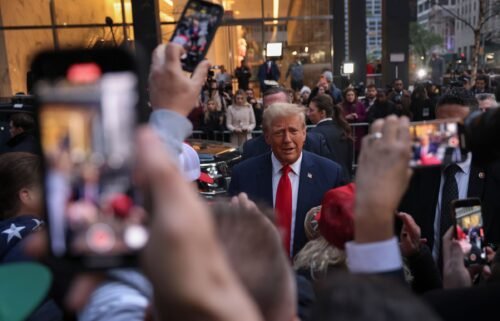Michael Bloomberg is the shadow looming over the South Carolina primary

In South Carolina, Michael Bloomberg is something of a phantom: He won’t be on the ballot in the state’s Democratic primary on Saturday, but you can still feel his presence. And the dueling attachments black voters here have to the billionaire reveal a lot about what the country tends to miss when it comes to the varied concerns of this voting bloc more generally.
As with his tenure as New York’s mayor, Bloomberg’s late-entry bid for the Democratic presidential nomination has become synonymous with “stop and frisk,” a discriminatory policing strategy that made targets of black and Latino men.
Indeed, anger is the first word Jasmine Johnson, 30, a grassroots organizer, thinks of when she hears Bloomberg’s name.
“There are better things he could’ve done with his money than hop into the race (this late) and stir up these feelings that people in New York City now have to relive,” Johnson told CNN. “It’s just trauma that we don’t need.”
How’s it possible, then, that in recent weeks, a candidate so publicly haunted by his prior backing of “stop and frisk” has managed to make meaningful inroads with, in particular, black voters? (His support rocketed from 7% in January to 22% in February, according to Quinnipiac University national polls.)
It’s a question that feels worth parsing as the country gears up for Saturday’s primary in the Palmetto State — where black voters make up a majority of the Democratic electorate — and for the Super Tuesday races that Bloomberg will compete in just days later, on March 3.
One reason for Bloomberg’s peculiar appeal isn’t too tough to understand: Over and over, black voters have underscored that trouncing President Donald Trump in the general election is their No. 1 priority, and Bloomberg has brought his campaign in line with this goal.
Via a media blitz worth hundreds of millions of dollars that’s flooded the Internet and airwaves, Bloomberg has channeled his energy almost entirely into knocking Trump. In doing so, he’s fashioned himself as the moderate alternative to former Vice President Joe Biden, the previous front-runner, who can end an administration that’s been a persistent source of unease for black Americans. (“America demanded change, and change is what we got,” the narrator says in one such ad, before it jumps to a supercut of the nadirs of the Trump era, including the 2017 white nationalist march in Charlottesville, Virginia.)
Or, as South Carolina Rep. Todd Rutherford — the House minority leader and an influential black leader in the state — put it in his endorsement of Bloomberg: “I believe he’s the only one who can take the ball and push it across the finish line.”
Yet Bloomberg’s allure stems from more than his perceived electability (already a gauzy concept). There’s the tangle of money and mobility to consider, too.
“Jobs creator, leader, servant & problem solver,” Columbia Mayor Steve Benjamin, a key black Democrat in the state and also the co-chair of Bloomberg’s campaign, tweeted in November. “I firmly believe that America needs Mike Bloomberg now.”
Jobs creator. Problem solver. Beyond providing staff positions with his campaign that pay more than his rivals’ (to mixed effect), Bloomberg has a platform that wrestles with empowering black communities on a more fundamental level, an ambition reflected in his Greenwood Initiative to “address the systemic bias that has kept black Americans from building wealth.”
One South Carolina voter, Tina Herbert, 45, who was previously the director of the Office of Business Opportunity for the City of Columbia, spoke directly to this point.
“When Bloomberg was in Columbia maybe one or two years ago, he worked with artisans who have a certain craft but don’t necessarily have business acumen,” Herbert recalled to CNN. “He wanted to work with that group of people to help them to build wealth with their skill set. And that resonates with people, including black Americans.”
Herbert highlighted a recent example of Bloomberg’s attention to black wealth: the announcement earlier this month that the billionaire made a historic, $3.5 million ad buy with the National Newspaper Publishers Association, which represents more than 200 black-owned community newspapers.
“The ad buy not only is a show of respect to the incredible impact and importance of African American journalism but also it is Mike walking the walk when it comes to his investing in African American-owned businesses,” Benjamin said at the time.
While Herbert supports Biden in the 2020 race, she acknowledged that Bloomberg’s move is noteworthy.
“I had to give them a thumbs-up for that one, because it wasn’t just throwing money out,” she said. “It was investing money in minority businesses.”
Something else Herbert said also stood out: that Bloomberg’s approach to courting black voters has seen some success in part because it gets at the profound skepticism many black Americans have of a government that, over the centuries, has done very little to earn their trust.
“You can’t depend on the government to lift people out of poverty,” she explained. This belief has, in turn, made the billionaire’s nods toward economic self-sufficiency strike a chord.
Theodore Johnson, a senior fellow at the Brennan Center for Justice, where he investigates the role of race in electoral politics, echoed some of Herbert’s sentiments.
“When it comes to black Americans’ expectations for government, they usually want a strong government for things such as protecting voting rights,” Johnson told CNN. “But when it comes to economic security, there’s fascinating research coming out showing that more and more view government-assistance programs less favorably because these programs have been stereotyped as handouts to black people who can’t make it on their own. And so they prefer a government that allows them to become economically self-sufficient.”
In regard to Bloomberg, “the more a candidate champions black economic self-determination, the more of an audience that candidate will have,” Johnson explained. (Jesse Jackson touted something similar in the 1980s, when he pushed for “silver rights.”)
Of course, black voters are no monolith. Despite the enthusiasm with which some members of this demographic in South Carolina have greeted Bloomberg, others look at him askance.
Johnson, the grassroots organizer, backs the other billionaire in the Democratic field, Tom Steyer, drawn to the candidate’s attention to local issues such as the clean water crisis in Denmark, South Carolina. While Steyer has yet to catch on nationally, he’s gained traction in the Palmetto State — according to a recent CBS News poll, he’s the first choice nominee for 18% of likely primary voters, behind only Biden (28%) and Vermont Sen. Bernie Sanders (23%).
“If you listen to the conversations about Bloomberg, they’re all about how he’s hurt people of color,” Johnson said, reiterating what for many here is a sticking point. “For Trump and hate to be the first things attached to your name, that’s not cool.”
It’s still an open question as to whether Bloomberg’s ballooning black support will last, especially in light of his poor performance on the debate stage in Las Vegas, Nevada.
“If Biden” — who’s long considered South Carolina to be his “firewall” but has recently seen cracks in it — “wins on Saturday, folks who were skittish about his chances may feel a renewed sense of his electability rolling into Super Tuesday,” Theodore Johnson said.
Still, regardless of what happens, it’d be ill-advised to gloss over the distinct pull Bloomberg has with a number of black voters in South Carolina and beyond. Democratic candidates perennially ask how to secure this vital voting bloc’s support — the answers may lie in the campaigns they least expect.




